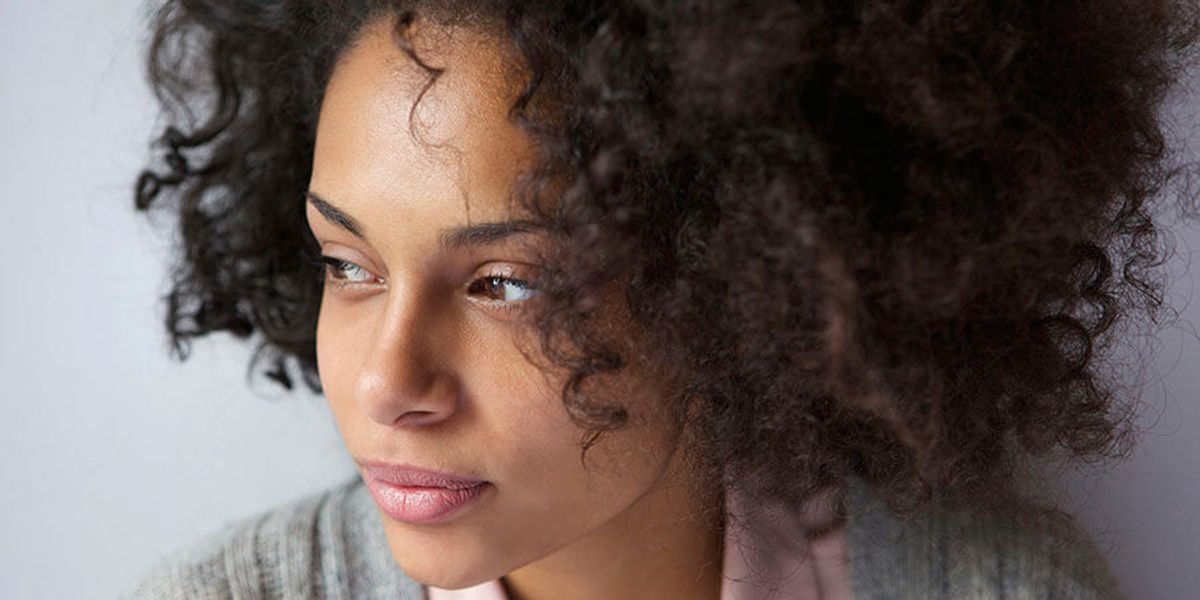
We’ve Said A Word About Toxic Fathers, But Who’s Talking About Toxic Mothers?
Growing up, I was made to feel like I was the problem and because I was in the midst of puberty, it was easy enough to use the misbehaved teenager as the scapegoat.
I recall my mother holding me responsible for her marital issues. Even more vivid in my mind, is being called an ungrateful b*tch for wanting my biological father to participate in debutante with me (a long story for a different day). And worst of all, I remember believing these things.
As I grow both in age and in maturity, I have come to see things with my mother for what they are: toxic.
Although I know of some of the struggles and hardships my mother faced growing up with an absentee mother, I can't pretend to know everything that comes with that baggage, nor would I dare to share a story that isn't mine to share.
What I do know is that she has beaten the odds like crazy, and as a result so did I. Statistically speaking, nothing about her childhood circumstances would have predicted a future as bright as hers. Not then, not in the years she worked to escape an abusive marriage, and not even now, after we've already witnessed the unimaginable watching her negate almost every statistic spewed about the future of teen moms.
In so many ways, she's won. But in never truly dealing with the trauma of her past, she's at risk of losing a lot more by isolating the people who love her.
My sister has already begun to feel the despair of our mother's behavior. She told me not too long ago that she feels like dying some days due to our mother's draining and constant negativity. My mother continues to push my brother to perfection, begging him to "man up" when he shows his more shy and reserved qualities unfit for her, tragically unable to see how this only hurts him.
In learning that "broken people break people", I've also learned to dial back my anger and evaluate my own expectations of who my mom should be. I'm understanding the importance of meeting her where she is but in turn that means recognizing where I am.
At the moment, as I work towards improving my own negative qualities, that means choosing the preservation of my own well-being over our relationship.
Toxic parenting is a vicious cycle of learned habits that are consequently passed down from generation to generation, if and when they are not corrected. Nonetheless, working through toxic shit also requires us to rise from our own sunken places, even though we are sometimes unable to recognize that they exist to begin with.
Related: It's OK Not To Talk to Toxic Parents
Because of this inability to recognize what's packed away in our baggage, there are a whole lot of kids taking on the unresolved issues of their parent's past. This baggage carries over into that child's own adult life, relationships, and parenting methods.
In being able to label my mother's behavior, it gave pause to my past, present, and future. I was able to undo some of the hurt from my adolescence by understanding it wasn't all in my head. I was able to pinpoint the ways that I'm like her, as well as work toward changing in hopes of not carrying out this particular part of her legacy.
It seems that we've put so much energy into focusing on the threat posed when a father figure is not up to par, that we've completely neglected to inform and check mothers who pose the same threat.
Children fall through the cracks of toxic motherhood every day, but there's little to nothing being said about it.
We as a society have normalized behavior that is actually toxic. Toxicity comes in many different forms and levels. These behaviors include jealousy, manipulation, and gaslighting, as well as constant criticism, never allowing you to speak without judging, dismissing, or berating you. Then, of course, there's playing the victim. Whatever pretty packaging that toxicity comes in doesn't negate the fact that it's still just that.
Cutting off parents, especially our mothers, is not always an option, and it's certainly never the easy option. But here's a word as someone who is putting in work now to ensure that this toxicity ends with me: I'm not in a place to tolerate negativity from any source. To be real, I have enough negative energy circulating in my own mind, there's no need for me to take on hers as well. If that means distancing myself from the woman who carried me, I'm prepared to be OK with that.
We're often told to be forgiving because of the circumstances that shaped our mothers, but at what cost?
Forgiveness should never mean sacrificing your sense of self, peace, and happiness.
My mother has dealt with a lot of heartache in her life, including a mother who was far more toxic and unstable than she is. As much as I empathize with all that she endured, it doesn't grant enough mercy for me to lay myself on the cross for her. The more I grow, the less willing I find myself to go back to a place where her psychological abuse is acceptable and tolerated simply because she's a better version of toxicity than her own mother.
We accept the love that we think we deserve, and I've been far too lenient in what I'm willing to accept from all parties involved. And, when I think of the type of behavior I overlook in regards to my mother, I know it's something I'd never consider entertaining if it were my partner, friend, or anyone else. At least not anymore.
With that in mind, I know I deserve more than what my mother can offer me right now and in order to seek it out, I have to respectfully decline her love...and so I do.
xoNecole is always looking for new voices and empowering stories to add to our platform. If you have an interesting story or personal essay that you'd love to share, we'd love to hear from you. Contact us at submissons@xonecole.com
Featured image by Getty Images
- Dealing With Toxic Parents - xoNecole: Women's Interest, Love, Wellness, Beauty ›
- My Family Gaslights Me: Signs & How To Overcome - xoNecole: Women's Interest, Love, Wellness, Beauty ›
- This Is How To Avoid Becoming The Toxic Mother That You Had - xoNecole: Lifestyle, Culture, Love, Wellness ›
- 10 Signs You Had Toxic Parents — And How to Break the Cycle ... ›
- Surviving the Toxic Parent | Psychology Today ›
- Distancing Yourself From Toxic Parents | HuffPost ›
- 13 Signs Of A Toxic Parent That Many People Don't Realize ›
- 9 Signs You Have A Toxic Parent ›
- 10 Signs You Have A Toxic Parent – HealthyWay ›
- 10 Traits of Toxic Parents Who Ruin Their Children's Lives Without ... ›
- Toxic Parents – Parents who do unloving things in the name of love ›
- 10 Traits of Toxic Parents Who Ruin Their Children's Lives - YouTube ›
- Toxic Parents: Overcoming Their Hurtful Legacy and Reclaiming ... ›
This article is sponsored by Hulu.
UnPrisonedhas returned for its highly anticipated second season, delving deeper into the complex dynamics of the Alexander family.
The series premiere comes a year after its debut season garnered rave reviews from fans and critics and earned record-breaking ratings for Hulu's Onyx Collective brand. UnPrisoned's success can be attributed to its raw, relatable themes and comedic appeal.
Inspired by creator Tracy McMillan's life, the show follows Paige (Kerry Washington), a therapist and single mother whose life takes an unexpected turn when her father, Edwin (Delroy Lindo) --who was released from prison-- moves in with her and her teenage son, Finn (Faly Rakotohavana).
Throughout UnPrisoned's first season, viewers witnessed how Edwin's incarceration deeply affected Paige's life and relationships. In the series, Paige unpacks her trauma through interactions with her inner child and her online followers. Meanwhile, Edwin is overcoming specific struggles with his own past that led to his life of crime, including a dysfunctional upbringing and his mother's arrest. As the Alexanders attempt to reconcile, new challenges arise.
This new season promises to further explore their unconventional family dynamic. Here are several compelling reasons why season two of UnPrisoned should be on everyone's watchlist.
The Alexander Family Life Is Still In Shambles
UnPrisoned's second season resumes where the series left off, with Paige grappling with the fallout from her troubled therapy practice and Edwin navigating life independently after moving out. Meanwhile, Finn faces his own challenges. The teenager is battling anxiety and seeking information about his father—a topic Paige avoids discussing.
The Alexander Family Are Attending Therapy To Resolve Their Underlying Issues
Amid the chaos in their lives, the Alexander family decides to mend their bond by confronting their past traumas. They seek professional help and attend therapy sessions with a “family radical healing coach,” played by John Stamos, a new cast member. This collective effort aims to unravel the complexities of their shared history and strengthen their relationships.
The process of unraveling each character's internal conflicts and their potential impact on future relationships may clash with Paige's textbook therapy approach. While Paige is used to being in the therapist's seat in both career and family, this forces her into the unfamiliar role of a patient during therapy sessions. This shift would compel her to look in the mirror and try a radically different approach.
The Alexander Family Learned A Big Lesson During A Therapy Session
In therapy, the Alexanders are tasked with addressing their individual traumas to salvage their remaining relationships. One of the family therapist’s eccentric suggestions was an exercise involving a family wrestling match. During this session, Paige faces tough questions about her refusal to share information about Finn's father.
While it's unclear whether this scene is reality or fantasy, the image of the family duking it out in the ring certainly makes for hilarious yet compelling television.
Paige Tries Dating Again Following Failed Relationships
Amid her life's chaos, Paige decides to step back into the dating field. However, her many attempts have left her with mixed results. The dating apps have turned out to be a fail, and an outing with her ex Mal (Marque Richardson), who is also her father's parole officer, doesn’t go quite as expected after he brings an unexpected guest – his new girlfriend.
The situation takes an awkward turn when Mal's new partner learns why the former couple split, partly due to Paige's self-sabotage.
UnPrisoned Is A Perfect Balance Of Comedy And Drama
As a dramedy, UnPrisoned takes a comedic approach to its heavy subjects. The show takes us on a ride with Paige's dating misadventures and navigating a friendship with her ex.
Other lighthearted moments include Edwin's attempts at CPR based on online videos and, of course, the antics of the Alexander family's unconventional new healing coach.
The second season of UnPrisoned is now available on Hulu.
UnPrisoned | Season 2 Trailer | Hulu
Feature image courtesy
Blair Underwood Initially Turned Down 'Sex And The City' Because 'It Was About How Samantha Was Fascinated By Dating A Black Man’
Actor and heartthrob Blair Underwood is opening up about why he turned down Sex and the City the first time he was offered a role. Many fans of the HBO series may recall Blair's time on the show in which his character was dating Miranda (Cynthia Nixon). However, he was previously offered another role where his character would date Samantha (Kim Cattrall).
During his interview with AV Club, the Set It Off star revealed that he was uncomfortable with the initial offer due to the character's fascination with him being a Black man.
“I actually did say ‘no’ the first time,” he said. “The first time they had offered the role, to be honest with you, it was about how Samantha was fascinated by dating a Black man and wanted to know if, uh, all of the rumors were true about our anatomy! And I said, ‘Listen, I’m honored, thank you, but I just don’t want to play a character based on race, on curiosity about a Black man.'”
But that didn't stop them from reaching out again. This time he was offered to play Dr. Robert Leeds, the love interest to Miranda and he decided to go for it. "So they were nice enough to call about a year later, and I said, 'Well, is it gonna be about race?' And they said, 'No, no, no, we’re not even gonna mention race!' And I think it really did only come up maybe once," he recalled.
"It did five episodes, and I think Samantha mentioned it once, saying something about 'a Black doctor' that Miranda was dating. And that’s really been a consistent thing in my career: not wanting to be boxed as 'the Black guy.'
"I’ve had that conversation with many producers along the way, and they were so great. They said, 'No, he’s just a doctor who Miranda meets in the elevator, and they have a nice little fling.' And it was amazing."
Blair has had a wide-ranging career playing everything from a lawyer on L.A. Law to playing Madame CJ Walker's husband on Self Made: Inspired by the Life of Madame CJ Walker. And during his interview, he revealed another role that he initially turned down, Set It Off. The movie, which is considered a classic in Black culture, stars Queen Latifah, Jada Pinkett Smith, Vivica A. Fox, and Kimberly Elise. Blair's character, Keith, played a banker and love interest to Jada's character, Stony.
He explained why he said no at first and eventually accepted the offer. "I had initially said “no” to that. Because I was playing this historic, iconic African-American historical figure in Jackie Robinson, and the time, y’know, there was Boyz N The Hood, and Menace II Society was out there, and I’d finished playing this noble Negro… [Laughs]," he said.
"And I’m reading the script, and there’s a scene where Jada Pinkett’s character—Jada Pinkett-Smith now—was going to sell her body so she could make some money to send her brother to college. And I remember, honestly, I threw the script across the room. I was, like, “I don’t want to do this. I want to do something uplifting for the Black culture and Black characters, and I don’t know if I want to see this.”
After a conversation with the movie's director F. Gary Gray and the actor's manager encouraging him to finish reading the script, Blair had a change of heart. What he first thought about the movie turned out to be totally different.
"So I finished the script, and I saw that the character they were asking me to play was really the love story in the midst of all of this turmoil of all of these characters, the four ladies: Queen Latifah, Vivica Fox, Kimberly Elise, and Jada," he explained.
"It was so well-written, it was such a great platform for them. And to be able to play the love story and the storyline that gave Jada’s character a leg up and a way out of this world, something to hope for, to wish for, someone to love her… I said, 'You know what? I’d like to be a part of that.'
"And I’m so glad I did, because that film resonates to this day. People all the time come up to me and say that they love that movie. So I’m glad that I did it."











